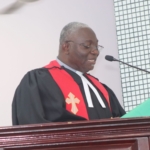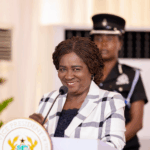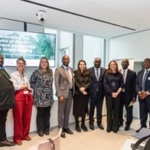
Ghanaian timber has made an impressive journey from the country’s lush high forest zone, such as the Western North, Western and Eastern regions, to the showrooms of Brussels.
This transformation has been some 16 years in the making and was marked in a significant ceremony, which witnessed the exchange of Forest Law Enforcement, Governance and Trade (FLEGT) licences between Ghanaian exporters and Belgian importers in Brussels.
This symbolised a landmark achievement in the legal and sustainable timber trade between Africa and Europe.
Ghana’s story of legality and sustainability turned heads and won hearts at the FLEGT celebration, resonating with European buyers.
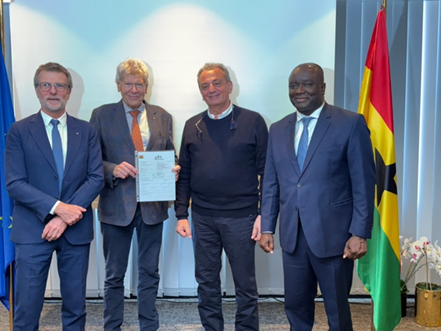
“What we were missing from the steps we were taking over the years is the legal timber regime that prioritises (the) environment and the needs of the inhabitants of these forest areas. I believe that this moment will inspire several countries… Ladies and gentlemen, I have a strong personal attachment to this issue we are discussing today,” said Ghana’s Ambassador to Belgium and the EU, Henry Tachie-Menson.
Director for Africa at the Directorate-General for International Partnerships at the European Commission, Geza Strammer, described the FLEGT licence as a piece of paper 15 years in the making.
“A piece of paper passing from a Ghanaian exporter to a European importer. But as everyone in this room knows, this is no ordinary piece of paper. It’s a forest law enforcement, governance, and trade licence. A document 15 years in the making. The product of dedication, partnership, and trust between Ghana and the European Union.”
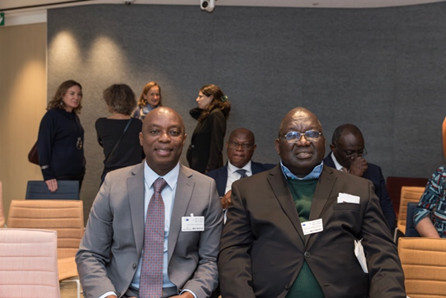
The Forestry Commission Board Chairman, Prof. Martin Oteng-Ababio, delivering the keynote address on behalf of the Minister for Lands and Natural Resources, Emmanuel Armah-Kofi Buah, said:
“It is a reaffirmation that partnership works, that patience pays, and that political will—sustained over time—can turn vision into reality. Let this milestone inspire nations still striving, and remind us all—governments, businesses, and citizens—that perseverance, inclusivity, and integrity will reward today’s toil with tomorrow’s triumph. Together, let us continue to build a world where the forests we harvest today do not deprive our children of the forests they will need tomorrow.”
CEO of the Forestry Commission, Dr. Hugh Brown, highlighted the achievement of FLEGT.
“Today, our TLAS integrates data from across the entire forestry value chain, linking forest management, transportation, processing and trade on a single cohesive digital platform. This system has not only improved transparency but has empowered us to make decisions based on evidence, respond to challenges in real time and plan more strategically for long-term sustainability. As a result, I can stand before you today and confidently say that a FLEGT licence from Ghana assures the market of timber from legally verified sources and responsibly managed forests.”
Armand Stockmans, co-founder of the European Timber Trade Federation and a buyer of Ghanaian timber for over 40 years, shared his reflections over the years.
“My first visit to Ghana dates back to the 1980s. I remember very well my first impression of Kumasi: countless grains, stretching as far as the eye could see. Each grain was a soul. This image has stayed with me ever since. Over these 40 years, I had the privilege of meeting many people.”
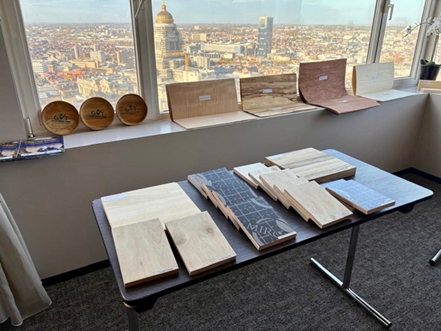
The FLEGT celebration also featured a private sector exhibition, where Ghanaian companies, including Samartex Timber and Plywood Co. Ltd., Tekura Designs Ltd., Logs and Lumber Ltd., and Miro Forestry Ghana Ltd., displayed secondary and tertiary wood products.
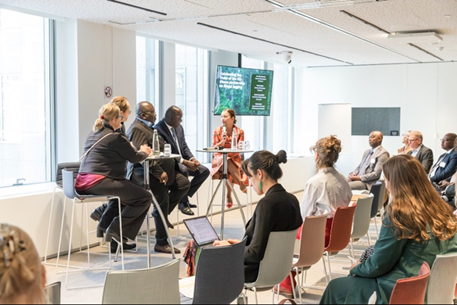
Meanwhile, Ghanaian officials, including representatives from the Ministry of Lands and Natural Resources (MLNR), the Forestry Commission and non-governmental organisations (Ecocare, FERN), met with some members of the European Parliament in a multistakeholder discussion to share insights from Ghana’s FLEGT journey.
The discussions centred on how the Voluntary Partnership Agreement (VPA) succeeded where other initiatives failed, tackling illegal logging through true partnership and verified timber legality.
Beyond legality, it promotes socially and environmentally responsible forest management, aligning with the expectations of the private sector.
The process required patience and political commitment, and despite moments when progress seemed slow or impossible, Ghana’s experience demonstrates that perseverance pays and offers valuable lessons for other countries seeking similar transformation.
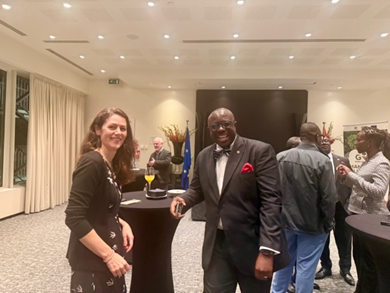
The day concluded with a reception hosted by Ambassador Tachie-Menson in honour of the government officials, private sector representatives and civil society partners in attendance, moderated by Clement Akapame Esq., a partner at Taylore Crabbe Barristers and Solicitors (TCBS).
The Forestry Commission donated an Ngwa stool from the Tekura to the Embassy, symbolising Ghana’s commitment to its culture and the sustainable management of its forests.
Ghana’s FLEGT licence now stands as a global blueprint for sustainable trade, forest stewardship, sustainability and leadership in Africa and on the world stage.
Ambassador Tachie-Menson said Ghana’s FLEGT accomplishment is worth emulating.
“For the rest of the world, this presents an opportunity for reflection [and] preservation and protection of the environment. This is an obligation we owe not [only] to ourselves, but to future generations for posterity.”
Ghana has set a global standard, paving the way for progress and inspiring nations to adopt same for positive growth and development.
FLEGT Background
On August 15, 2025, Ghana officially began issuing Forest Law Enforcement, Governance and Trade (FLEGT) licences, marking a historic milestone in the nation’s journey toward legal and sustainable timber trade. Ghana became the first African nation and the second in the world, after Indonesia, to issue the licences.
This achievement marked a historic milestone in Ghana’s commitment to sustainable forest governance and the promotion of a legal timber trade. The FLEGT initiative was established by a partnership between the Government of Ghana and the European Union to fight illegal logging and promote trade in legally harvested timber and timber products.
Ghana thereby affirmed its commitment to strengthening forest law enforcement, governance improvement and the promotion of responsible timber trade. This move not only positioned Ghana as a leader in sustainable forestry practices but also reinforced its role as a model for other countries looking to strengthen their timber trade regulations while protecting their forest resources.


